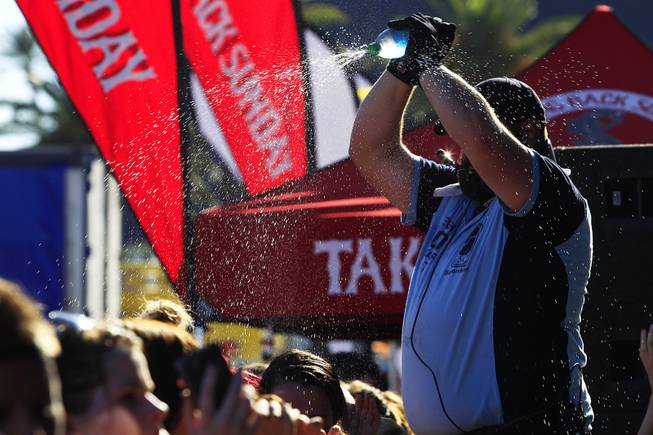
Sam Morris / Las Vegas Sun
A security guard cools off fans with water during the Las Vegas stop of the Vans Warped Tour Wednesday, June 20, 2012.
Friday, May 17, 2013 | 2 a.m.
More from the Sun
Las Vegas might be in for a hotter summer than usual.
That's the prediction the National Weather Service has given for the Las Vegas area for the next few months, according to Chris Stachelski, a meteorologist at the weather service's Las Vegas office.
"Nothing is ever definite, but all the signs are favoring a warmer-than-normal summer," Stachelski said Thursday.
How much hotter? The weather service doesn't make that specific of a prediction. But the average of all the daily temperatures this summer could be between half a degree and 2 degrees higher than normal, he said.
This summer's prediction for Las Vegas was made in the weather service's Climate Prediction Center in the Washington, D.C., area.
Las Vegas already has had a taste of hot weather. The first 100-plus degree days of the year came Monday (102) and Tuesday (101) before high temperatures dropped into the 90s for the rest of this week.
Those first two triple-digit days came about two weeks earlier than normal, according to weather records. The average first day of hitting the 100-degree mark is May 26.
The next 100-degree day isn't yet in the local forecast, which covers only the next seven days. But it will probably be sometime within the next 10 days, Stachelski said.
This week's 100-degree heat wasn't part of the equation for predicting a hotter summer, he said.
The long-range forecasts are based mostly on the region experiencing a dry winter, he said. Less snow last winter in the mountains will mean less runoff and ground moisture this spring and summer, Stachelski said.
"The biggest tipping factor would be lack of snowpack and the dryness of the ground, which makes it heat up faster," he said.
The Climate Prediction Center is calling for a 54 percent chance for above-normal temperatures, Stachelski said.
Stachelski predicted those higher temperatures might occur in the overnight hours, not during the day.
He explained that temperatures usually cool in the desert during the evening. But as the Las Vegas area has developed, more concrete structures and asphalt pavement have led to the buildings retaining the heat from the day. Those heat-retaining man-made structures contribute to higher nighttime temperatures, he said.
Usually, overnight temperatures in the summer drop into the 80s, with only a few days a year when overnight lows don't drop below 90 degrees, Stachelski said. This summer, overnight lows might stay above the 90-degree mark more often than normal.
But he didn't expect the warmer summer to mean more days of record-high temperatures.
Las Vegas usually gets about 70 days of 100-plus-degree weather during the summer months, with about 25 of them coming in July, he said. The Las Vegas Valley usually gets only a handful of 110-plus-degree days each year.
Since temperature records started being kept in the 1930s, the all-time high of 117 degrees was hit twice — in the summers of 1942 and 2005. Las Vegas has seen temperatures hitting 116 degrees 18 times, with the last being in 2007.
Last year's hottest days of the year were July 10 and 11, when temperatures peaked at 114 degrees.
What about rain and wind? Stachelski said it's still too early to predict what the monsoon season will bring. It runs from about June 15 through Sept. 30, when moisture moves up from Mexico, across the Southwest, bringing occasional isolated thunderstorms and strong winds.
He said some forecasters think there's a potential for the monsoon season to be especially active, based on conditions similar to last year, when there wasn't much snowpack.
However, other forecasters disagree, saying there is no dominating global pattern that shows any reason for a stronger monsoon, he said.
"They are going for equal chances for it to be above-, near- or below-normal precipitation," he said. "It's always tricky with the monsoon."

Join the Discussion:
Check this out for a full explanation of our conversion to the LiveFyre commenting system and instructions on how to sign up for an account.
Full comments policy